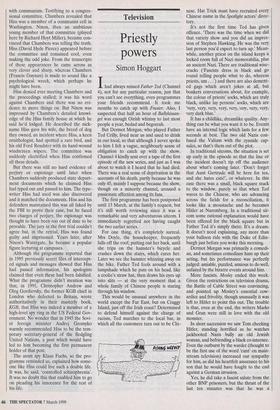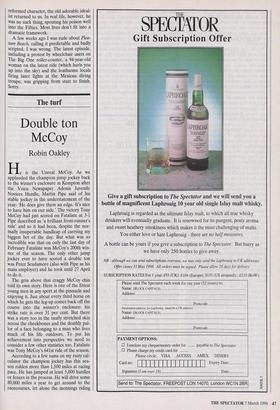Television
Priestly powers
Simon Hoggart
Ihad always missed Father Ted (Channel 4), not for any particular reason, just that you can't see everything, even programmes your friends recommend. It took me months to catch up with Frasier. Also, I suspected that half an hour of Ballykissan- gel was enough Oirish whimsy to last most people a year, bedad and begorrah.
But Dermot Morgan, who played Father Ted Crilly, lived near us and used to drink in our local, so that although I never spoke to him I felt a vague, neighbourly sense of obligation to catch up with the show. Channel 4 kindly sent over a tape of the first episode of the new series, and just as I was about to watch it I heard that he had died. There was a real sense of deprivation in the accounts of his death, partly because he was only 45, mainly I suppose because the show, though on a minority channel, aroused a passionate affection among its fans.
The first programme has been postponed until 13 March, at the family's request, but it's still worth reviewing since it was a remarkable and very adventurous sitcom. I immediately regretted not having caught the two earlier series.
For one thing, it's completely surreal. Mrs Doyle, the housekeeper, frequently falls off the roof, putting out her back, until she trips on the hamster's bicycle and crashes down the stairs, which cures her. Later we see the hamster whizzing away on the bike. Father Ted fools around with a lampshade which he puts on his head, like a coolie's straw hat, then draws his eyes up into slits — at the very moment that a whole family of Chinese people is staring through his window.
This would be unusual anywhere in the world except the Far East, but on Craggy Island, just off the Irish coast? Determined to defend himself against the charge of racism, Ted marches to the local bar, in which all the customers turn out to be Chi- nese. Hat Trick must have recruited every Chinese name in the Spotlight actors' direc- tory.
It's not the first time Ted has given offence. 'There was the time when we did that variety show and you did an impres- sion of Stephen Hawking. He was the very last person you'd expect to turn up.' Mean- while, another priest on the island keeps a locked room full of Nazi memorabilia, plus an ancient Nazi. There are traditional wise- cracks (`Fascists dress in black and go round telling people what to do, whereas priests, um . ..) and there are also dement- ed gags which aren't jokes at all, but bonkers conversations about, for example, the colour of priests' socks, which are truly black, unlike lay persons' socks, which are `very, very, very, very, very, very, very, very, very dark blue.'
It has a childlike, dreamlike quality. Any- thing can be what you want it to be. Events have an internal logic which lasts for a few seconds at best. The two old Nazis con- fused the Valium with the cyanide cap- sules, so that's them out of the plot.
In traditional sitcoms, the situation is set up early in the episode so that the line or the incident doesn't tip off the audience about what's coming later. 'Don't forget that Aunt Gertrude will be here for tea, and she hates cats!', or whatever. In this case there was a small, black square stuck to the window, purely so that when Ted waves to the Chinese, who are advancing across the fields for a reconciliation, it looks like a moustache and he becomes Hitler at Nuremberg. In a traditional sit- com some rational explanation would have been offered for the black square but in Father Ted it's simply there. It's a dream. It doesn't need explaining, any more than your balloon ride with the Duke of Edin- burgh just before you woke this morning.
Dermot Morgan was primarily a comedi- an, and sometimes comedians ham up their acting, but his performance was perfectly judged: amiable, puzzled, anxious to do well, unfazed by the bizarre events around him.
More fascists. Mosley ended this week. Given the restrictions on television drama, the Battle of Cable Street was convincing, and pointed up Mosley's essential cow- ardice and frivolity, though unusually it was left to Hitler to point this out. The trouble is that, even at the end, the writers Marks and Gran were still in love with the old monster.
In short succession we saw Tom cheeking Hitler, standing horrified as he watches jackbooted Nazis bully an old Jewish woman, and befriending a black co-internee. Even the outburst by the warder (thought to be the first use of the word 'cunt' on main- stream television) increased our sympathy for him, as did his heartfelt assurance to his son that he would have fought to the end against a German invasion.
Yes, he did take a fascist salute from the other BNP prisoners, but the thrust of the last ten minutes was that he was a reformed character, the old adorable ideal- ist returned to us. In real life, however, he was no such thing, spouting his poison well into the Fifties. Most lives don't fit into a dramatic framework.
A few weeks ago I was rude about Plea- sure Beach, calling it predictable and badly scripted. I was wrong. The latest episode, including a protest by wheelchair users on The Big One roller-coaster, a 94-year-old woman on the latest ride (which hurls you up into the sky) and the loathsome locals firing laser lights at the Mexican diving troupe, was gripping from start to finish. Sony.



























































 Previous page
Previous page